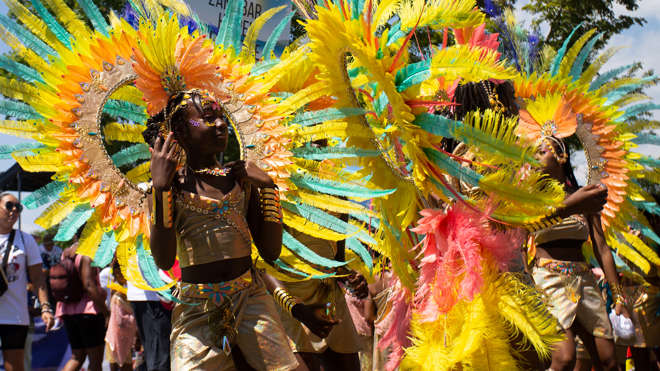I remember the first time I attended Toronto’s Junior Carnival, back in 2019. The sky threatened rain, but nothing could dampen the electric energy of hundreds of children adorned in feathers, sequins, and vibrant fabrics as they danced down Malvern’s streets. This year, that same energy returned with even greater force.
Last weekend, thousands gathered for the 2024 Junior Carnival, transforming Toronto’s streets into a kaleidoscope of Caribbean culture. Children as young as three paraded in elaborate costumes, their faces beaming with pride as steel pan rhythms filled the air.
“This is about more than just a parade,” explained Alicia Thomas, whose daughter Zara participated for the first time this year. “It’s about connecting our children to their heritage in a way textbooks never could.”
The Junior Carnival has evolved significantly since its beginnings in the 1970s, growing alongside Toronto’s Caribbean diaspora. What started as a small community celebration has blossomed into one of the city’s most anticipated cultural events, drawing participants and spectators from across Ontario and beyond.
For many families, preparation begins months in advance. In a small community center in Scarborough, I watched as volunteer designers helped children create costumes that told stories of Caribbean mythology, history, and environmental awareness. One group’s theme centered on protecting Caribbean coral reefs, with costumes featuring delicate fabric representations of endangered marine life.
“We’ve been working since February,” said Marcus Bennett, who leads one of the carnival’s oldest masquerade bands. “The children learn about design, cultural symbolism, and teamwork. By the time carnival day arrives, they understand what they’re representing.”
The educational aspect runs deep. According to the Caribbean Cultural Committee of Toronto, participation in Junior Carnival activities correlates with stronger cultural identity and higher community engagement among second and third-generation Caribbean-Canadian youth. These findings mirror similar studies from the Ontario Arts Council showing that cultural festivals significantly improve community cohesion in diverse neighborhoods.
Beyond the spectacle, Junior Carnival serves as a vital cultural bridge. For parents like Devon Richards, who immigrated from Trinidad fifteen years ago, the event offers a tangible connection to home.
“When I was growing up, Carnival was part of our school curriculum,” Richards told me as he adjusted his son’s elaborate headdress. “Here in Canada, we have to create those learning opportunities ourselves. This is how we ensure our children understand where they come from.”
The economic impact is substantial too. Local designers, food vendors, and musicians all benefit from the celebration. A 2023 report from Tourism Toronto estimated that Caribbean cultural events, including Junior Carnival, contributed over $30 million to the city’s economy last year.
Yet challenges remain. Organizers struggle with rising costs and the complexity of obtaining permits. Community elder Pamela Johnson, who has been involved since 1982, expressed concern about gentrification pushing Caribbean communities—and their cultural spaces—to Toronto’s periphery.
“We used to be centered downtown, but now we’re scattered across the GTA,” Johnson explained. “It makes maintaining traditions harder, but also more important.”
Still, innovation thrives. This year featured new elements blending traditional carnival artforms with contemporary youth culture. One section incorporated spoken word poetry alongside calypso music, while another featured costumes made entirely from recycled materials—addressing environmental concerns while honoring carnival’s tradition of creative resourcefulness.
The crowd itself reflected Toronto’s multicultural reality. I stood next to families from South Asian, Eastern European, and East African backgrounds, all drawn into the celebration’s infectious spirit. Children from diverse backgrounds danced alongside Caribbean-Canadian participants, creating new connections through shared joy.
As the parade reached its conclusion at Malvern Community Centre, exhausted but exhilarated children gathered for the awards ceremony. Beyond the trophies and ribbons, the real prize was evident in their faces—a sense of belonging and cultural pride that will resonate long after the music fades.
“This is why we do it,” said veteran carnival organizer Claudette McFarlane, watching the children compare costumes and share stories. “For one day, they’re not just Canadian kids with Caribbean backgrounds—they’re royalty, they’re artists, they’re keepers of tradition.”
In a city where multiculturalism is both celebrated and challenged, Junior Carnival stands as a testament to the power of cultural preservation through joy. It reminds us that heritage thrives not through isolation but through sharing—inviting others to witness, respect, and join in celebrations that make Toronto richer for everyone.
As the setting sun cast long shadows across the festival grounds, children still danced, their costumes catching the golden light. Parents looked on, many wiping away tears. In that moment, Toronto wasn’t just a home away from home—it was home itself, transformed through the beautiful persistence of Caribbean carnival culture.






